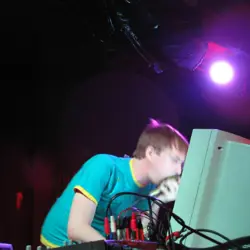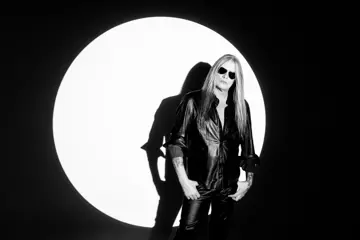 Machinedrum
Machinedrum2011 was a big year for Travis Stewart. For starters, he released a supremely well-received album under his solo moniker of Machinedrum in Room(s), which went on to take out #2 in Resident Advisor's 2011 Best Album poll. Then his collaborative project with Praveen Sharma, Sepalcure, released a self-titled debut LP late in the year, just in time for it to pop in at #47 on Pitchfork's Top Albums Of 2011 list. So scrap this story's first sentence and please replace it with this: 2011 was a ridiculously massive year for Travis Stewart. So if you're still asking 'Who is Travis Stewart?' it's time to do your ears a favour and get acquainted.
Raised by harmonica, piano and even miniature bagpipe-wielding “hippies” in North Carolina, his multi-instrument-happy parents instilled within Stewart a love of creating diverse music soon after he could crawl. Catching the attention of Miami tastemaker Merck, Stewart already had his first album released by the age of 18 – Triskaideka, under his Syndrone alias on Merck Records. A year later, his Machinedrum alias had its first baby, Now You Know, on Merck/P-Vine Records (also responsible for releasing albums by the likes of Múm and Low that year). Even then Pitchfork was heralding his praises like nobody's business, Malcolm Seymour III (yep, they were just as Pitchforkentious back then) proclaiming the 19-year-old's album to setting the “standard by which the next wave of imitators aspires.”
Countless aliases, remixes, collabs and hard work later, the production machine that is Travis Stewart is now also a highly respected DJ, to the point where his last few years have been spent almost entirely on the run, leaving a trail of decimated dancefloors across the globe. Touring with the likes of SBTRKT and Hudson Mohawke, dominating venues such as Fabric and Tresor and playing Sonar Festival are just a few examples of what Stewart's last year's worth of touring dates have included. Considering this, it's a wonder how he's had time to produce many quality songs at all, let alone two of electronic music's most critically acclaimed albums in the one year. Yet Stewart sees it differently. In fact, he sees his constant movement as an integral part of last year's breakthroughs.
“I just basically had time to write tracks on trains and planes and stuff like that, so it was a very in-the-moment kind of process,” explains a calm and considered Stewart. “I kind of would lose myself in those moments and then come away with it and look back at what I did. It was almost like a dream-like thing, so I would get somewhere, like finally have some off-time and be able to listen to all the stuff – all the ideas that I started whilst I was on the road – and they all had this kind of natural sound that went together, and it was really exciting to just see it come out of nowhere in a way, without trying too hard to force anything.
Don't miss a beat with our FREE daily newsletter
“I think it's necessary for artists to learn how to abandon their art and not hold on to it so strongly over time, because the more time you add to the actual release of the art, the more you start over-thinking it,” Stewart adds. Despite his prolific output from even early on in his career, perfectionism has been a trait that Stewart, like so many brilliant artists throughout history, has battled with. However, his obsession with refining has been cured to some extent by somewhat of an unexpected source; the author of the book Eat Pray Love (yes, the one responsible for Hollywood in turn ruining Bali's Ubud), Elizabeth Gilbert.
“She gave this pep talk about the idea of genius and creativity and she basically mentioned all these things about how people kind of think of the idea of genius as being this kind of internal thing, where 500 or thousands of years ago people moreso considered the idea of genius to be an external thing that kind of changed through them during these moments of genius. I think that kind of inspired me in a way to not put so much pressure on myself to think, 'Where is this next idea gonna come from?' and have to think really hard about what I'm gonna do next because it's really important and it's up to me. And, you know, I kind of realised that it's more important to just practice and learn more about my craft as much as I can, and let the ideas come when they come instead of trying to force them out. It's a pretty inspirational speech, you should look it up!”
While he may be working on curing the negative impacts that his perfectionist streak may have on creating things naturally, his busy schedule still seems at odds with creating such innovative and sublimely produced forms of music, without the use of a Tardis. “I'll just be doing stuff off-time, riding on trains, sometimes people wanna go out on my off-night and I wanna basically stay away from clubs as much as possible 'cause that's where I live more or less, so I find chances more than you would think.” So is he the stereotype of a beat-producing nerd? “Kind of,” Stewart laughs. “I mean, I've always got my laptop with me, it's like an extension of me, and if an idea comes at a moment I wanna be there to be able to get it down as quickly as possible. I think also, with this new sort of approach to writing tunes, I try to get out the most important part of the song within the first two or three hours that I work on something just so I can have that to go back later and dissect it and make it into a full song.”
Whilst his production obsession might be sounding a little like he could make for a character on The Big Bang Theory, his DJing schedules would make Leonard and Sheldon's heads explode. It's also necessitated the move from the Big Apple to the techno capital city of the world. “I started getting booked more in Europe, and the shows were generally bigger and better, guaranteed, so the move to Berlin just kind of made sense. I have a lot of friends there, almost as many as I did in New York, and I just really enjoyed the vibe there. It was cheaper than New York, and at this point in my life I'm trying to play as many shows as possible before I get too burnt out.”
Lined up soon is his next Australian tour. With his sound primarily swirling from the emotional atmospherics of Burial to the intelligent drum patterns of Four Tet, tech-tinges of Rustie, glitch hop of Prefuse73 and experimentalism of Aphex Twin, but then house, 2-step, hip hop and drum'n'bass also coming into many of his equations, it's no surprise his sets generally take in a rather varied smattering of tasty genres. With new EP SXLND out and a mysterious New Beats Teaser 2012 freshly thrown up on his Soundcloud, you can probably expect a good dose of the tunes to be dished on the platters that matter to be his as well. “You can definitely expect new jams from me,” Stewart confirms, “and new stuff from friends, remixes, VIP versions of tunes, some a capellas thrown in; just a mix of everything, but very high energy, very high tempo. You'll hear some 90s rave shit in there, who knows!” Perhaps we'll even see him singing on the mic, as he did just recently at one of his glowingly received SxSW showcases.
So out of Machinedrum's Room(s) and Sepalcure's self-titled LP, which of his 2011 albums is Stewart proudest of? “That's a hard question 'cause they both are very unique kinds of things,” Stewart ponders with a deep breath. “I'm proud of both equally – they just seem like completely different situations on their own. Whereas for the Sepalcure release, obviously I have another person to celebrate that with and we kind of remind each other what we're doing it for. When I'm doing it solo and I'm reading a different review I can pat myself on the back, but I tend to lose perspective without that second person. And I think that's basically what it comes down to – the big difference between the collaborative process and solo work is just having that perspective changed.”
Collaboration Is Key
Travis Stewart's passion for working with others was cultivated early in his career. Moving to New York, he joined up with DMC Champion IE.Merg to help build the Normrex label, producing for vocalists such as Theophilus London (including providing the beats for his pivotal This Charming Mixtape), Mickey Factz and windy city soul singer Jesse Boykins III. He's also collaborated with Foreign Beggars, Yo Majesty, Azealia Banks, Addiquit, Tiombe Lockhart and many more. So what does he look for in a musical partner and preferred process? “For me the best collaborative work I've ever done has always been in person, in the studio, working together, instead of sending back a capellas and beats and stuff like that, because nine times out of 10 there's gonna be no connection,” Stewart explains. “So if I'm in the studio with somebody and they're kind of like, 'Hey, I kind of want a beat like this,' and they play me some shit I've never heard of on Youtube or something and I get inspired, then so be it. But, you know, it's less about deciding, 'Hey im gonna change my sound,' and more of it just being just a natural thing.”
A fellow New Yorkian, Stewart's intimate work with Little Miss 212, Azealia Banks, warrants the question: is she really worth all the hype, or just a one-hit wonder who's popularity will diminish once she loses a Certain expletive from her songs? “You know, it's hard for me to say what will blow up and what won't 'cause I don't immerse myself in the pop world enough to know what's going to blow. But if it was based on talent, definitely; she is one of the most talented people I've ever worked with, and for her age, it's just really exciting to see where she's gonna go.”
As for remixes, his list of highlights includes Scuba's M.A.R.S, Johnny Cash's Belshazzar (and yes, an official, endorsed one), Bonobo's Eyesdown (as found on his recent Black Sands Remixed compilation), Solange's Sandcastle Disco and Gang Colours' Fancy Restaurant. Oh, and Jacques Greene's The Look, the young house innovator and highly tipped producer also touring Australia together with Machinedrum, including their Perth date. “He's a really good producer, he's a good friend of mine, he's actually on his way over…,” begins Stewart, with the respect he has for the young gun obvious, before the phone cuts out… Guess you'll just have to find out for yourself why these two artists are leading forward-thinking beats into a whole new future.















